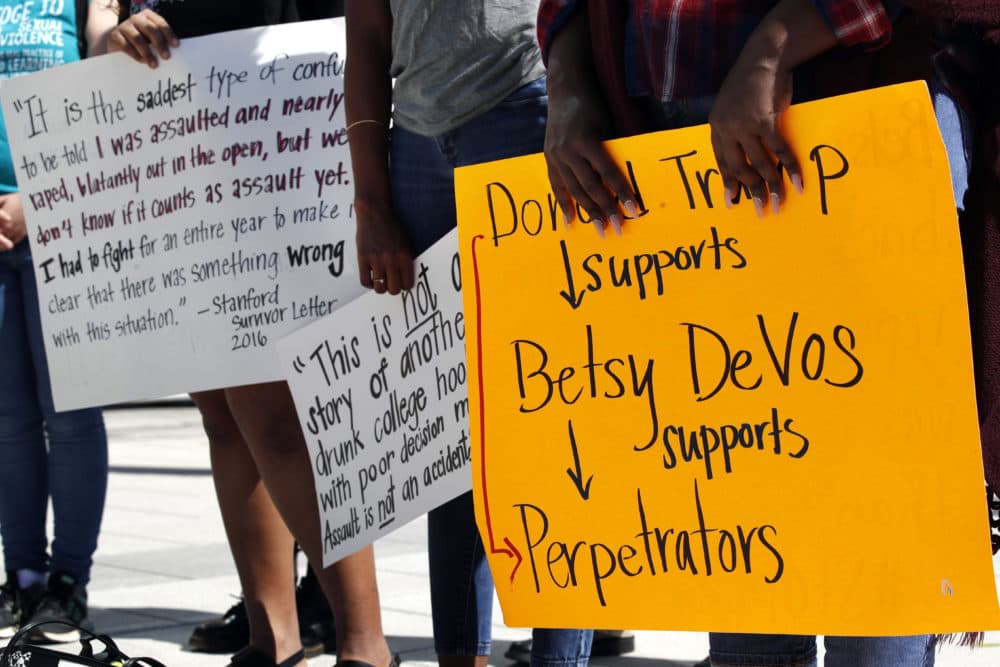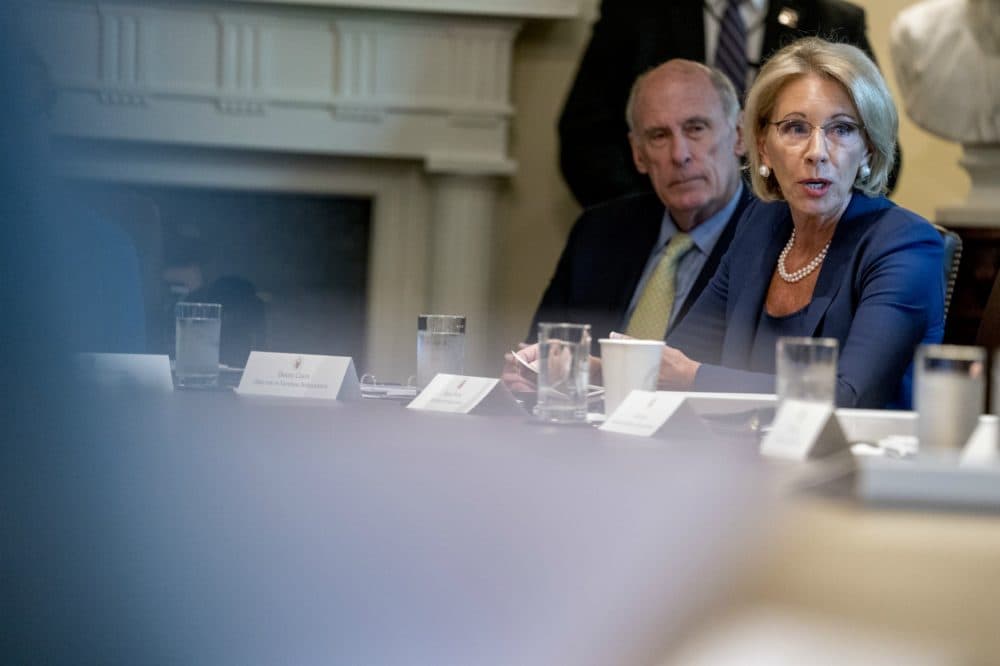Advertisement
Commentary
Instead Of Protecting Victims, Title IX Changes Would Favor Institutions And Perpetrators

More than 250,000 college students arrived in Boston this month to begin their fall semester. According to data from the U.S. Department of Justice, 1 in 4 female students in this cohort, and more than 11 percent of all students, will be sexually assaulted before they graduate.
It’s in this context that we should consider U.S. Education Secretary Betsy DeVos’ new proposal regarding sexual violence on college campuses. As you may recall, last fall DeVos said that the Obama administration’s recommended enhanced protections for victims of sexual violence (first released in 2011) were a “disservice to everyone involved,” and rescinded them.
Now we have a glimpse into a policy draft that errs not on the side of victims, but on the side of perpetrators of sexual assault, while potentially benefiting a system — higher education — that is already not doing enough to protect the most vulnerable. If DeVos’ proposal becomes law, it would be to the detriment of victims and all students.

The Obama 2011 guidelines defined sexual harassment as any “unwelcome conduct of a sexual nature.” DeVos’ proposal changes the definition to:
… unwelcome conduct on the basis of sex that is so severe, pervasive and objectively offensive that it denies a person access to the school’s education program or activity.
Under DeVos’ proposed changes, institutions would only be required to investigate assaults that are reported to “an official who has the authority to institute corrective measures.” Even though the truth is, students are more likely to confide in a residential or faculty advisor with whom they have close contact. This is especially true for international students — who account for 1.2 million of those enrolled and who may have implicit cultural barriers (or explicit linguistic ones) that make it difficult to formally assert themselves via official administrative channels.
DeVos’ proposal also offers the possibility that those who are accused of assault would be permitted to cross-examine their alleged victims. This has been widely criticized by many including Jess Davidson, executive director of the nonprofit End Rape on Campus, who in a press release said, “To let survivors be cross-examined by a person who has violated them is downright cruel.”
If DeVos’ proposal becomes law, it would be to the detriment of victims and all students.
And it is already difficult for students to come forward. As a graduate student, I watched a friend and classmate struggle over the decision to report a sexual harassment situation that was increasingly making her feel unsafe. She echoed the sentiment of many others when she said, "I just want that person to know the effect that this had on me and make sure they don't do it to someone else." The majority of students don't actually want to press charges. Requiring the reporting process to be more formal could eliminate the opportunity for such dialogue.
Devos’ proposed changes also suggest that institutions would only be required to investigate assaults that occurred on campus. This, despite the fact that only 14 percent of all college students — 25 percent of full-time students — live on campus. And given that 70 percent of all sexual assaults happen in a victim’s home or living quarters, the numbers don’t add up.
Finally, though these proposed changes are said to be sparked by a desire for across-the-board consistency, institutions would be able to craft their own evidentiary standards to rule on cases, which means that at the end of the day, there would be no consistent standards of practice.
Advertisement
Title IX, while not a panacea, is a far-reaching federal civil rights law that prohibits discrimination on the basis of sex at any institution receiving any kind of federal funding. Most schools, including colleges and universities, fall under this umbrella.
Title IX provides fundamental protections to all students — including guaranteeing equal access to all educational and other opportunities. But it is through its intersection with the Clery Act, which requires colleges and universities to report crime statistics and be proactive about campus safety, that Title IX means to protect victims of campus sexual assault. This is arguably Title IX’s most important provision.
[Devos'] changes ... bolster the rights of those accused of assault, harassment or rape. That isn't progress.
Under current policies, colleges must notify students of counseling resources, provide alternative housing and instructional arrangements for victims per request, provide information about reporting options and procedures and notify students of case outcomes. While Title IX offers a jumping off point, much more can be done to provide an environment that empowers victims, without erasing them. The Obama-era recommendations were a step in the right direction.
As an educator and staunch student advocate, I believe that Secretary DeVos’ proposed policies not only run counter to an informed understanding of campus life but are also potentially dangerous, putting victims’ emotional and physical well-being at risk.
Thanks to #MeToo, the public has become more attuned to the pervasive and insidious nature of sexual violence, more sensitive to survivors, and aware that sexual and gender-based harassment is often implicit. DeVos’ proposal seems out of step with the transformation now occurring in public and professional spaces outside of academia.
In contrast, her changes do nothing to advance protection for victims, but instead reduce liability for the institutions that should stand behind them, while simultaneously bolstering the rights of those accused of assault, harassment or rape. That isn't progress.
This fall, more than 19 million students will attend college or university in the U.S. We should be expanding Title IX protections, not retracting them.
